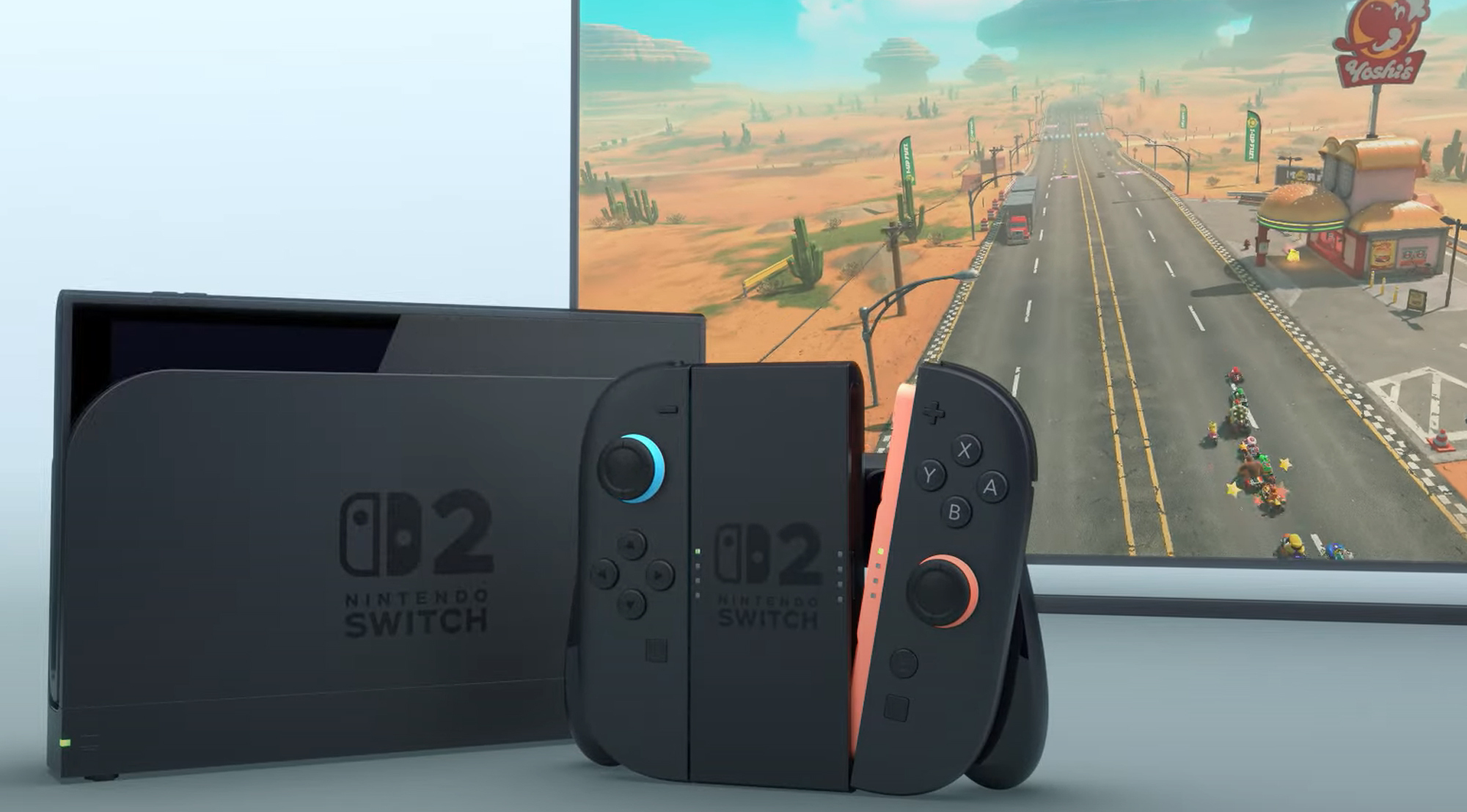Samsung Galaxy Book 4 Ultra vs. MacBook Pro 16-inch: Which premium laptop is the winner?
Can Samsung's Galaxy Book overtake the MacBook Pro?
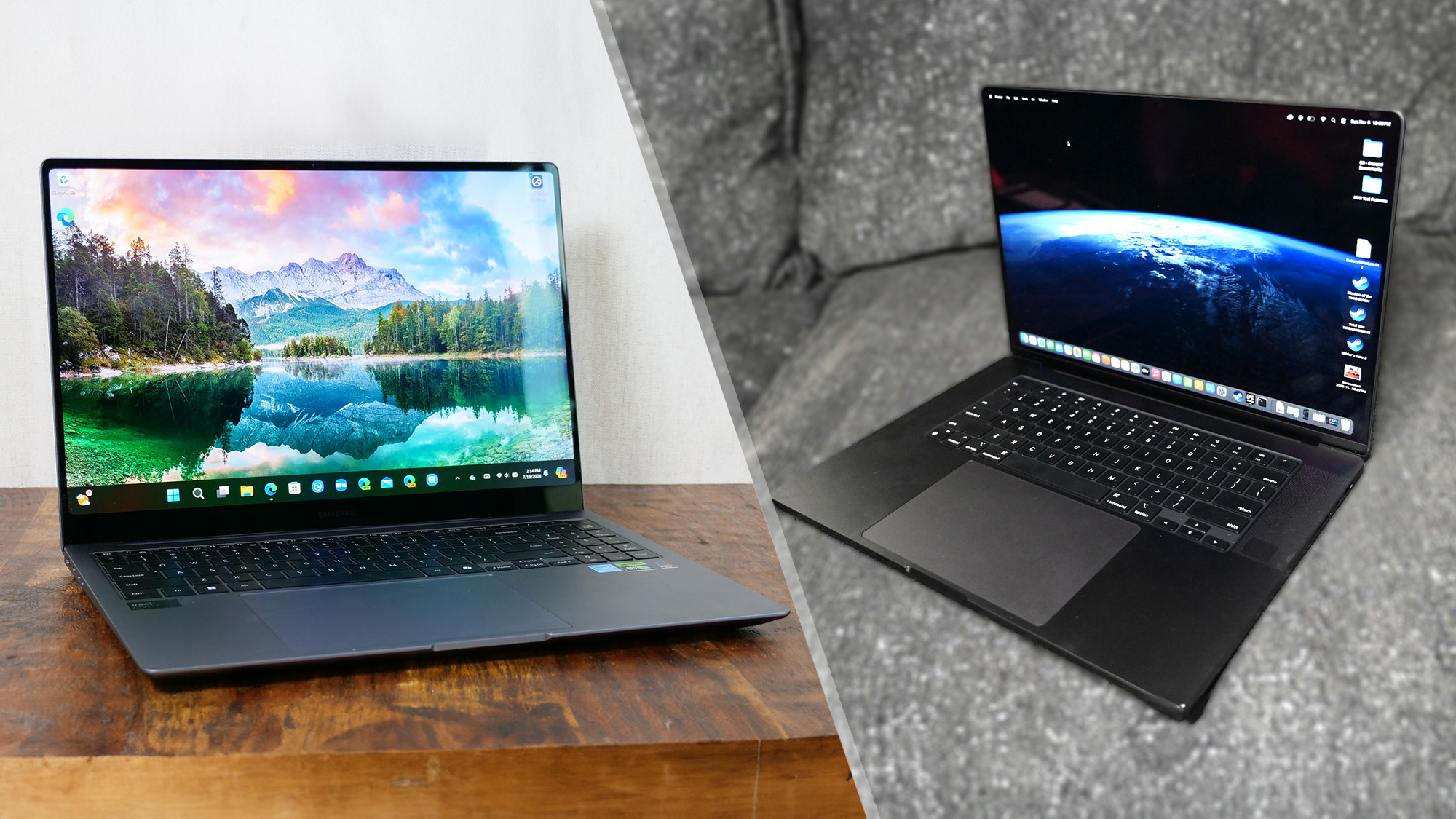
In the smartphone world, Samsung and Apple are the biggest rivals, but when it comes to laptops, Samsung doesn't have anywhere near the market share or mindshare that Apple enjoys. However, Samsung can hold its own.
The Samsung Galaxy Book range of laptops has thoroughly impressed Laptop Mag reviewers in the past few years, and that includes the Galaxy Book 4 Ultra.
The Book 4 Ultra is the pinnacle of Samsung's lineup.
The Book 4 Ultra is the pinnacle of Samsung's lineup with a 16-inch AMOLED display, up to an Intel Core Ultra 9 185H CPU, and an Nvidia GeForce RTX 4070 GPU. That's a potent combination, so we decided to have it square off against Apple's MacBook Pro 16-inch M3 Max from last year.
Both of these laptops received 4.5 out of 5 stars from us and an Editor's Choice award, so it's sure to be an exciting matchup. The winner could cost $3,000, so the stakes are high.
Read on for a closer look at the Samsung Galaxy Book 4 Ultra vs. MacBook Pro 16-inch M3 Max.
Samsung Galaxy Book 4 Ultra vs. MacBook Pro 16-inch: Specs
| Spec | Samsung Galaxy Book 4 Ultra | MacBook Pro 16-inch (2023) |
| CPU | Intel Core Ultra 7 155H or 9 185H | Apple M3 Max 16-Core CPU |
| GPU | Nvidia GeForce RTX 4050 or 4070 GPU | 40 Core GPU |
| RAM | 16GB - 32GB | 36 - 128GB |
| Storage | 1TB SSD | 1TB - 8TB SSD |
| Display | 16-inch 3K Dynamic AMOLED 120Hz touchscreen | 16-inch Liquid Retina XDR 3456 x 2234-pixel display |
| Size | 14 x 9.86 x 0.64 inches | 14 x 9.7 x 0.65 inches |
| Weight | 4.1 pounds | 4.8 pounds |
Samsung Galaxy Book 4 Ultra vs. MacBook Pro 16-inch: Price
The Samsung Galaxy Book 4 Ultra pricing makes this category slightly messy; let me explain. There are two configurations of the Book 4 Ultra. The top option features an Intel Core Ultra 9 185H CPU, an Nvidia GeForce RTX 4070 GPU, and 32GB of RAM. The lower configuration drops this to an Intel Core Ultra 7 155H, an Nvidia Geforce RTX 4050 GPU, and 16GB of RAM.
When it comes to overall value for most buyers, the Galaxy Book 4 Ultra takes the win.
The total retail price for these models is $2,999 and $2,399, respectively. However, you should never expect to pay those prices directly from Samsung. The lower configuration is $1,899, and the top configuration is $2,399 at the time of publication. This isn't a short-term sale either; the prices have remained at or below these marks for months.
Get The Snapshot, our free newsletter on the future of computing
Sign up to receive The Snapshot, a free special dispatch from Laptop Mag, in your inbox.
By comparison, the base MacBook Pro 16 M3 Max starts at $3,499 with 36GB of RAM and the 14-core M3 Max CPU with 30-core GPU. Our review configuration was $3,999, which included an upgrade to 48GB of RAM, a 16-core CPU, and a 40-core GPU. While Apple itself doesn't have any discounts on these models, you can find the base M3 Max for $3,099 at B&H ($400 off) or our review configuration for $3,699 at Best Buy ($300 off) at the time of publication.
Both are premium laptops, and as you'll see, there are some areas where the MacBook Pro will justify that price jump for some users, but when it comes to overall value for most buyers, the Galaxy Book 4 Ultra takes this category.
Winner: Samsung Galaxy Book 4 Ultra
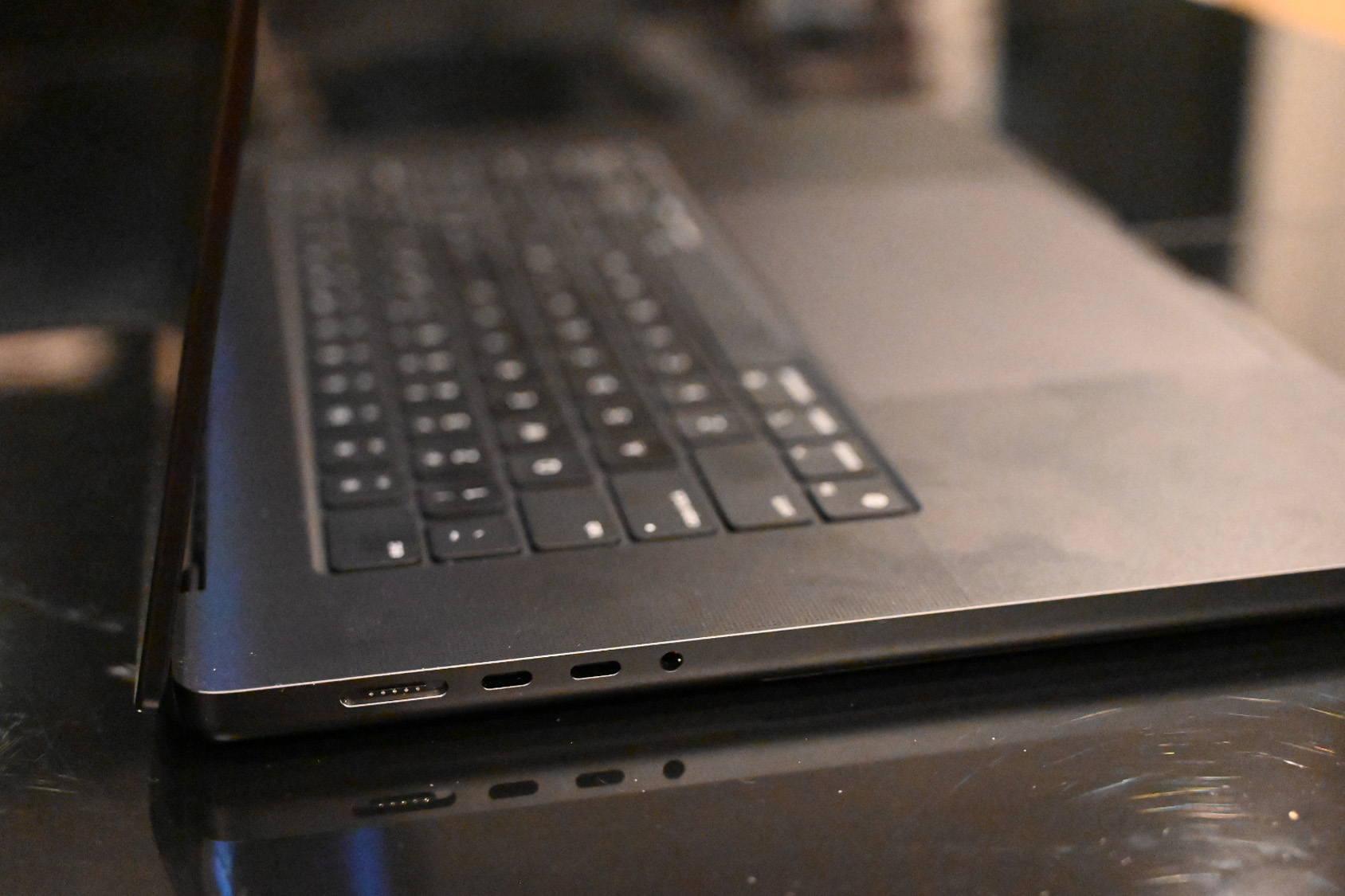
Samsung Galaxy Book 4 Ultra vs. MacBook Pro 16-inch: Design
The MacBook Pro design is "classic," but dull is another way to spin that. The 2021 design refresh brought back the ports that we'll address in a later section. Still, the notched display design remains somewhat contentious, and the laptop has been unchanged for over a decade.
The Samsung Galaxy Book 4 Ultra offers slightly more exciting design elements. Its clever wedge (something MacBooks once employed) tapering toward the front makes it look thinner and hides the vents along the sides of the laptop.
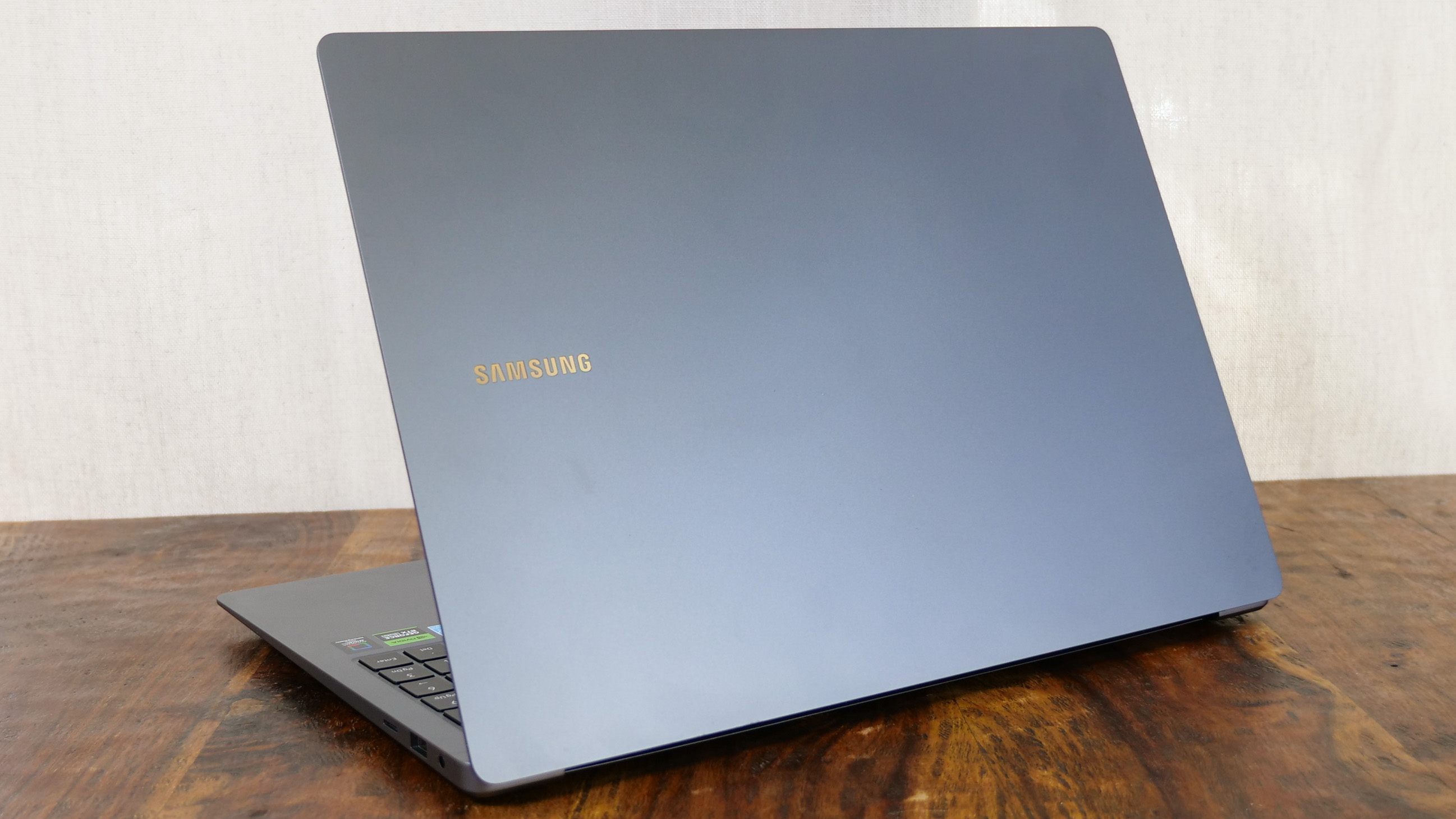
Both laptops are aluminum, so there are no clear winners there. If environmental impact is something you consider when making a purchase, the MacBook Pro has "over 35% recycled content in the entire product," according to Apple, with 100% recycled aluminum in the enclosure. Samsung uses 30% recycled aluminum in the rear case and 20% in the upper and front cases, so Apple gets the sustainability win.
Apple also offers double the color options of Samsung, with an impressive two: Space Black and Silver. The Galaxy Book 4 Ultra is only available in "Moonstone Gray," a fairly innocuous dark gray.
At 14 x 9.86 x 0.65 inches and 4.1 pounds, the Samsung Galaxy Book 4 Ultra is nearly a whole pound lighter than the MacBook Pro 16-inch 2023, which measures 14 x 9.7 x 0.65 inches and weighs 4.8 pounds.
Apple's environmental win and color choices make this category a draw. The Galaxy Book 4 Ultra is considerably lighter, so if you are a regular traveler or have a long commute carrying your laptop bag, that may sway you in Samsung's direction.
Winner: Draw
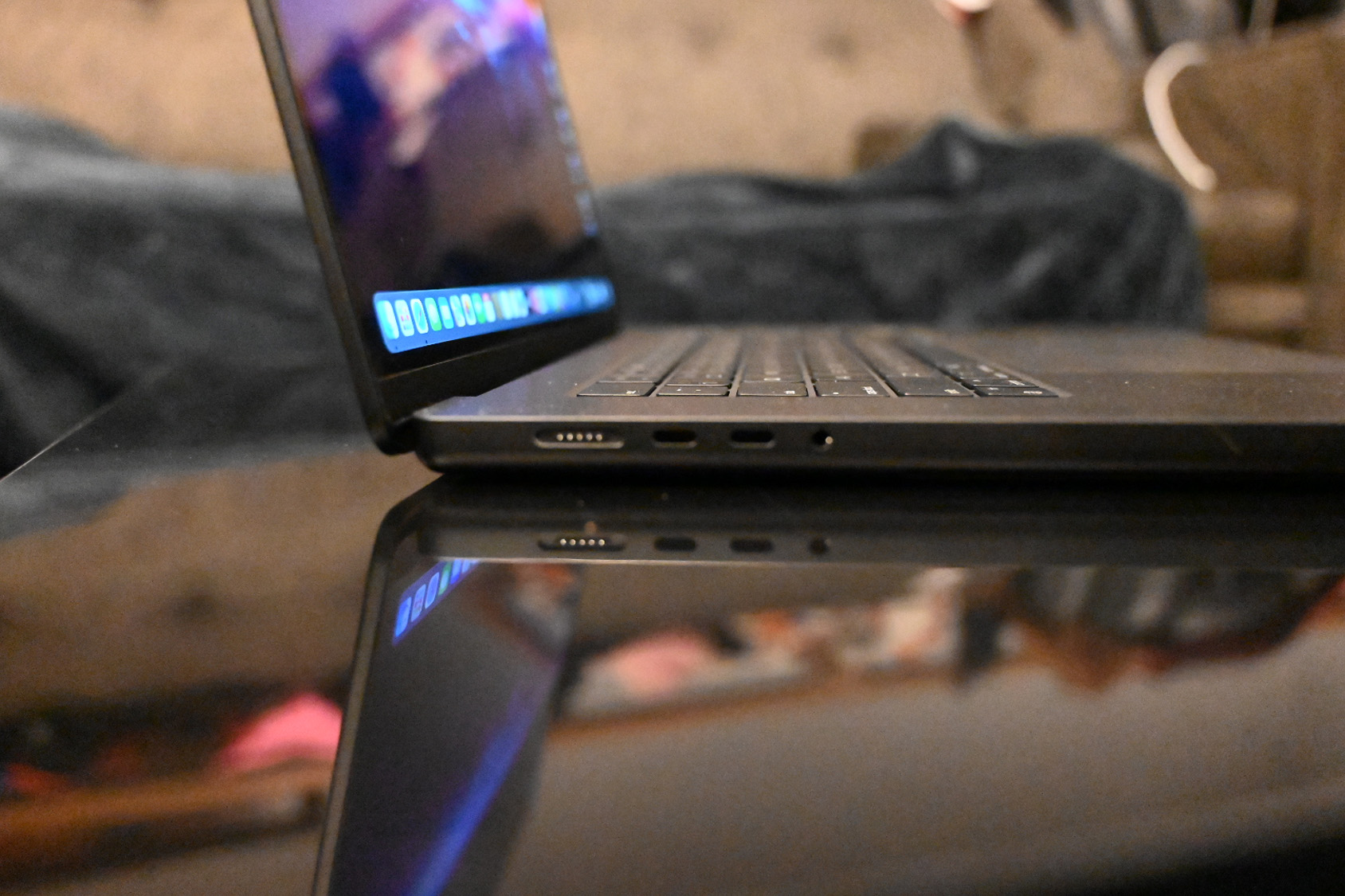
Samsung Galaxy Book 4 Ultra vs. MacBook Pro 16-inch: Ports
This is a close one as both laptops offer a nearly identical array of ports with just a few crucial differences that will decide the winner.
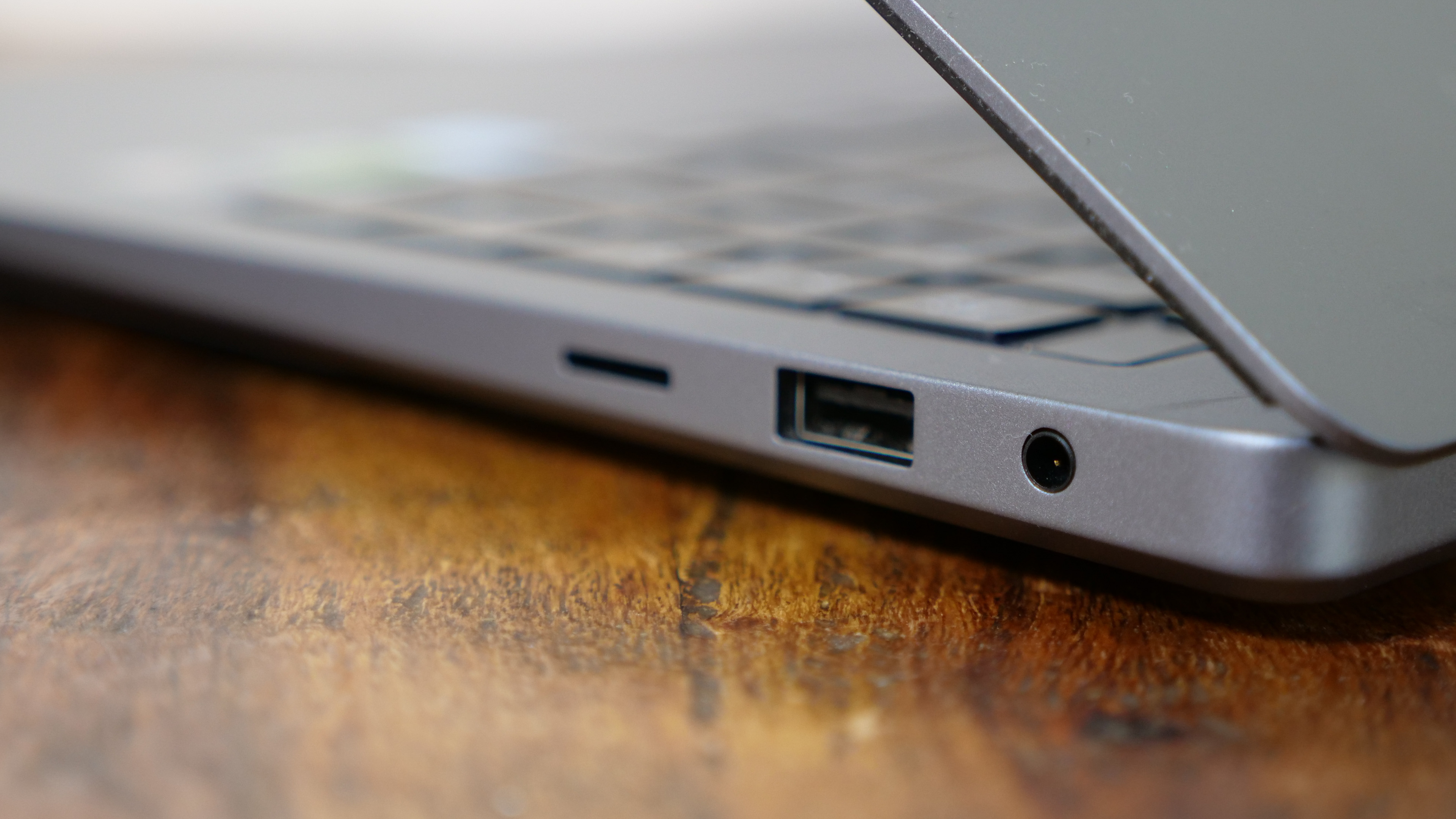
The Samsung Galaxy Book 4 Ultra boasts two Thunderbolt 4 ports, an HDMI port, one USB Type-A port, a headphone jack, and a microSD card slot. Meanwhile, the MacBook Pro 16-inch packs three Thunderbolt 4 ports, MagSafe charging, an HDMI port, a headphone jack, and an SDXC card slot.
That full-size SD card slot is a boon for many photographers and videographers, but the USB Type-A port is more universally applicable. It's a narrow win, and depending on your specific needs, this could undoubtedly tip in the other direction, but this category goes to the Galaxy Book.
Winner: Samsung Galaxy Book 4 Ultra
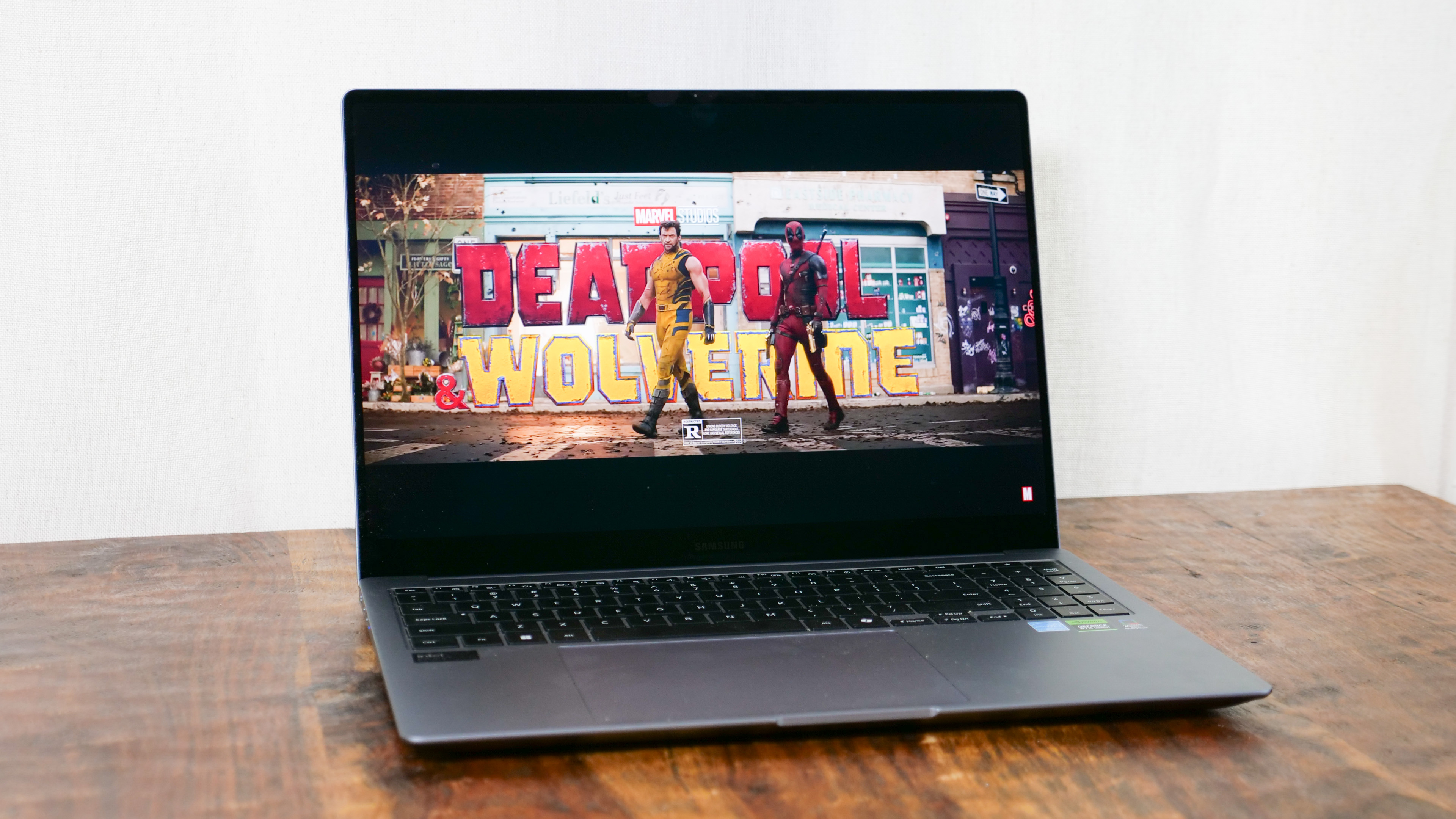
Samsung Galaxy Book 4 Ultra vs. MacBook Pro 16-inch: Display
Both laptops are heavily targeted towards content creators, making display quality vital. I'll dig into how each one performed in our lab tests shortly, but first, let's look at the fundamental differences between OLED and mini-LED technology in these laptop displays.
The Samsung Galaxy Book 4 Ultra features a Samsung Dynamic 2X AMOLED touchscreen (2,880 x 1,800 pixels) with an adaptive 120Hz refresh rate. An anti-reflective cover glass improves viewing angles and visibility in harsh lighting conditions. OLED boasts the best possible black levels and contrast while delivering superior viewing angles.
Apple's MacBook Pro 16-inch uses a Liquid Retina XDR display (3,456 x 2,234 pixels) with an adaptive 120Hz refresh rate. The underlying mini-LED display tech used in the MacBook gives you a blend of QLED and OLED features with much higher brightness and less likelihood of burn-in over time. While not matching the OLED, it still delivers superior contrast and black levels to a traditional LED or LCD panel.
Now, here's how they performed in our lab.
| Laptop | DCI-P3 color gamut | Display brightness | Delta-E color accuracy |
|---|---|---|---|
| Samsung Galaxy Book 4 Ultra | 81.8% | 384 nits | 0.32 |
| MacBook Pro 16 M3 Max | 81.8% | 560 nits | 0.13 |
If you want to pixel peep, the MacBook Pro is the clear sharpness winner with its 3,456 x 2,234 16.2-inch display compared to 2,880 x 1,800 on a 16-inch display for the Galaxy Book 4 Ultra. That's 254 pixels per inch (ppi) for the MacBook and 212 ppi for the Galaxy Book.
Color reproduction is remarkably tied between these two, at 81.8% of the DCI-P3 color gamut on each laptop. These are good results, but not great ones, as the premium laptop average is 87.5%. Both displays look vibrant in person and are good enough for video and photo production.
While the MacBook Pro has superior color accuracy with a Delta-E score of 0.13 vs. 0.32 for the Galaxy Book, this is an imperceptible difference to the human eye, so don't let that sway you.
Display brightness is the biggest benchmark differentiator between these two laptops. The MacBook Pro's mini-LED panel allows it to hit a much brighter 560 nits, while the Galaxy Book's OLED can only reach 384 nits. The Galaxy Book does feature an anti-reflective cover glass on the display, so it's usable in sunlight, but there's no question the MacBook is the brighter panel.
I mentioned it earlier in this section, but the Galaxy Book's touchscreen could be a differentiator for some users who like the ability to interact directly with elements on the screen. Still, the sizeable clamshell laptop design isn't conducive to this usage.
While both displays look great, the MacBook Pro wins this round with its higher resolution and brightness.
Winner: MacBook Pro 16-inch 2023
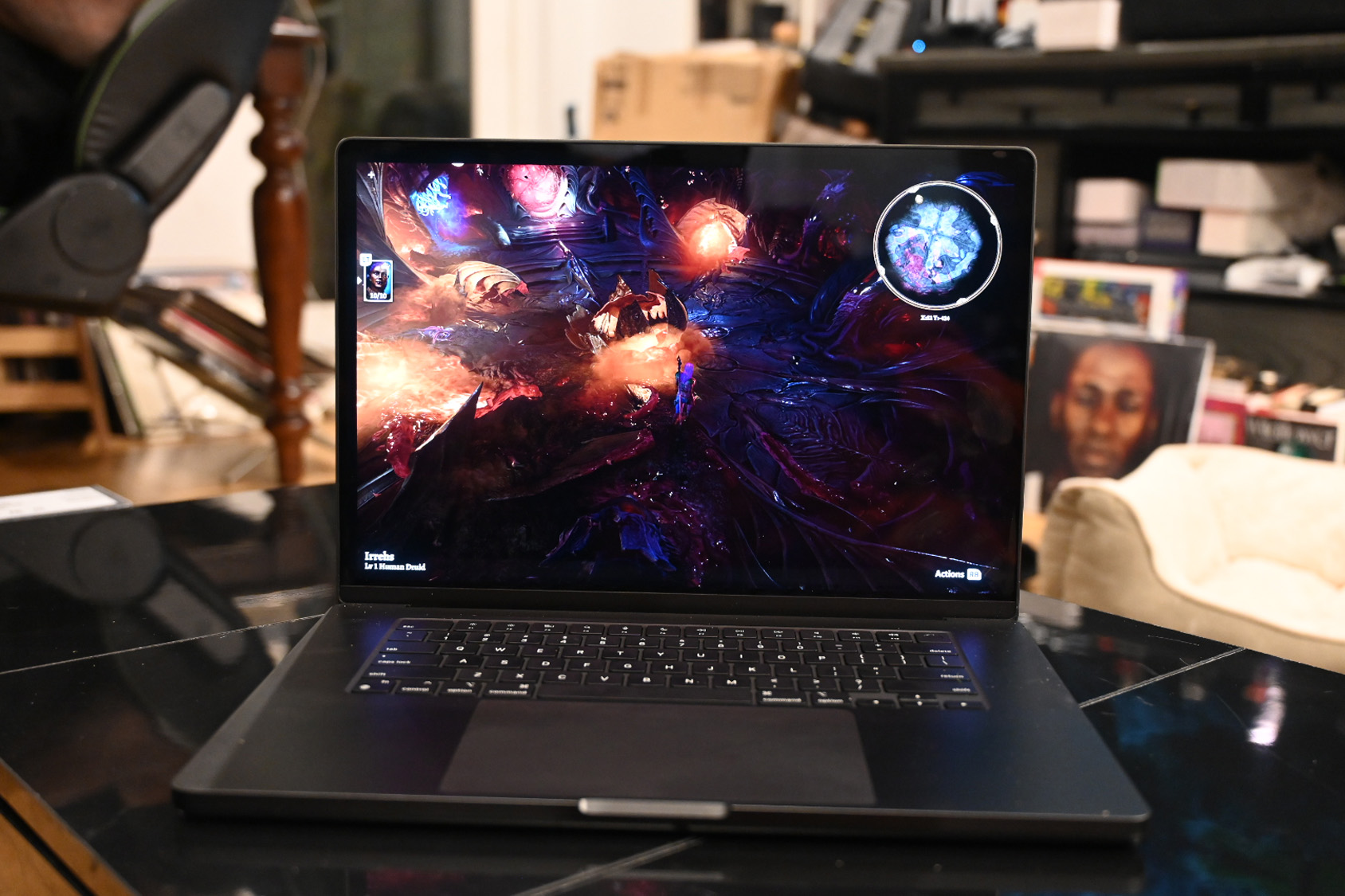
Samsung Galaxy Book 4 Ultra vs. MacBook Pro 16-inch: Performance
The Samsung Galaxy Book 4 Ultra that we reviewed featured a top-end Intel Core Ultra 9 185H CPU, while our MacBook Pro 16-inch utilizes Apple's M3 Max chipset.
This is a tough draw for Samsung, as the MacBook Pro 16-inch M3 Max is the most powerful laptop we've ever tested from a pure performance perspective.
| Laptop | Geekbench 6 | Handbrake time |
|---|---|---|
| Samsung Galaxy Book 4 Ultra | 13,061 | 4:52 |
| MacBook Pro 16 M3 Max | 21,182 | 2:36 |
On the Geekbench 6 test, the MacBook scored a preposterous 21,182, dramatically outscoring the Galaxy Book 4 Ultra's 13,061. To put this in perspective, the average premium laptop score on this test is 8,763, slightly more than the difference between the scores for these two laptops.
Our handbrake test loads the 6.5GB open-source "Tears of Steel" 4K video onto the laptop and then converts it in Handbrake using the Fast 1080p30 preset. The Galaxy Book 4 Ultra finished in 4 minutes and 52 seconds.
Once again, this easily beats the premium laptop average of 7 minutes and 21 seconds, but the MacBook Pro flew through the conversion in just 2 minutes and 36 seconds.
Regarding raw performance, there's no defeating the MacBook Pro 16-inch M3 Max.
Winner: MacBook Pro 16-inch M3
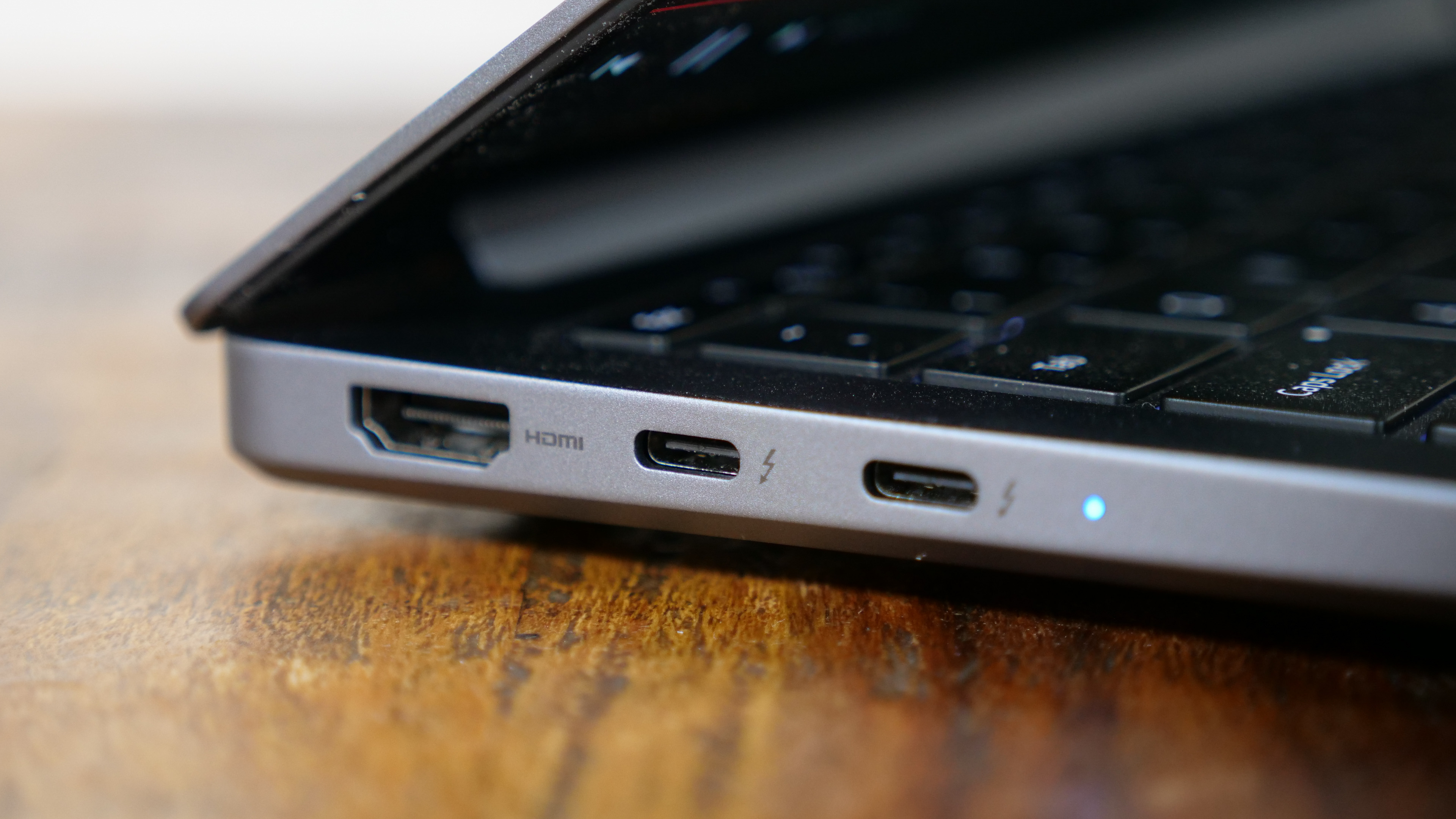
Samsung Galaxy Book 4 Ultra vs. MacBook Pro 16-inch: Battery life
The Samsung Galaxy Book 4 Ultra offers excellent battery life, reaching 13 hours and 15 minutes in our Laptop Mag battery test, which runs a set group of webpages on a loop with the laptop set at 150 nits of brightness using wifi until it dies.
Unfortunately for Samsung, the MacBook Pro 16 M3 Max was the longest-lasting laptop until recently, hanging on for 18 hours and 5 minutes in our test.
The Galaxy Book 4 Ultra is no slouch, but this is an easy win for the MacBook.
Winner: MacBook Pro 16-inch
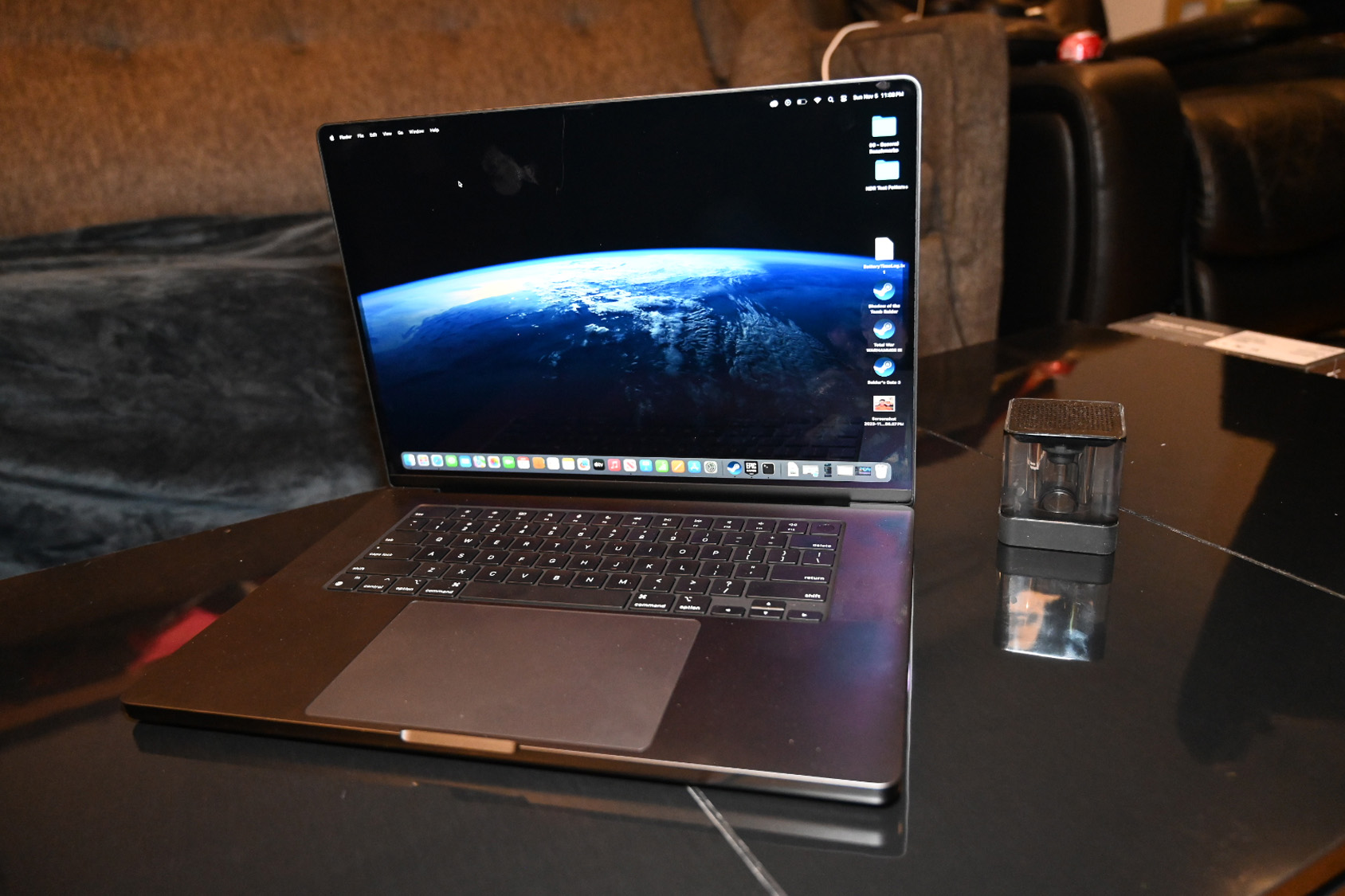
Overall winner
If you've been keeping a scorecard, you'll see that the MacBook Pro 16 M3 Max is winning today. It's not a runaway victory, but it's also not quite as close as the 3-2 category wins (with one draw) may suggest.
The MacBook dominates in battery life and performance. While the Galaxy Book 4 Ultra isn't bad in either category, the MacBook is class-leading in performance and just one removed from the top of the podium in battery life. These are two of the most significant factors for most laptop buyers.
On the other hand, the Galaxy Book 4 Ultra scored a narrow win with its ports and pricing. The former could depend on what accessories you use with your laptop. At the same time, the latter is somewhat subjective, given that the higher price may be justified if you need the vastly superior performance of the MacBook Pro.
One factor we can't consider, as it will differ from one user to the next, is what ecosystem you are in already. If you own an iPhone or an iPad, the MacBook Pro will offer much better integration with your other devices. If you use an Android phone, particularly a Samsung Galaxy phone, the Galaxy Book 4 Ultra will be a better ecosystem fit for you.
I recommend the MacBook Pro 16 M3 Max for most people, but both laptops earned 4.5 out of 5 stars from us and an Editor's Choice, so if the Galaxy Book 4 Ultra seems a better option for you, rest assured it's also an excellent laptop.
Sean Riley has been covering tech professionally for over a decade now. Most of that time was as a freelancer covering varied topics including phones, wearables, tablets, smart home devices, laptops, AR, VR, mobile payments, fintech, and more. Sean is the resident mobile expert at Laptop Mag, specializing in phones and wearables, you'll find plenty of news, reviews, how-to, and opinion pieces on these subjects from him here. But Laptop Mag has also proven a perfect fit for that broad range of interests with reviews and news on the latest laptops, VR games, and computer accessories along with coverage on everything from NFTs to cybersecurity and more.

